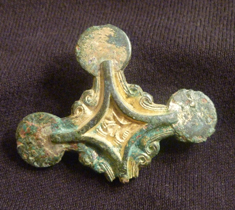Archaeologists reveal rare Anglo-Saxon feasting hall
Release Date 31 October 2012

A rare Anglo-Saxon feasting hall has been spectacularly uncovered by a team of archaeologists from the University of Reading working at Lyminge in Kent. The Guardian have today featured this amazing discovery in the newspaper and on their website.
This is the first discovery of a previously unknown Anglo-Saxon ‘Great Hall' in over 30 years and one of only a handful of such major buildings to be excavated in its entirety. Large enough to accommodate up to 60 people and forming part of a formal complex of buildings, the hall would have been used as a venue for royal assemblies attended by the king and his armed entourage.
The current excavations, funded by the Arts and Humanities Research Council (AHRC) with support from project partners Kent Archaeological Society and staff from the Canterbury Archaeological Trust, are designed to shed new light on Lyminge as a key site for understanding the origins of Christianity in Anglo-Saxon England.
Previous excavations have shown that extensive remains of a 7th to 9th century Anglo-Saxon monastery lie preserved literally inches beneath open areas of the village; the Great Hall discovered in 2012 represents a royal precursor to the monastery. However a geophysical survey failed to reveal the hall and its discovery was entirely unanticipated.
See photos of the dig and finds on our Facebook page >>>
Dr Gabor Thomas, from the University of Reading's Department of Archaeology said: "This hall is remarkably well preserved. With a ground-plan in excess of 160m square, the hall is comparable in scale and importance to some of the largest Saxon timber halls previously excavated in England at sites such as Yeavering and Cowdery's Down.
"The Hall provides an exceedingly rare glimpse of royal accommodation of a type otherwise evoked in the Anglo-Saxon poem Beowulf. Such structures were manifestly not ‘houses'; they were prestigious buildings used at specific times for a specific purpose such as periodic gatherings involving feasting and gift-giving that reinforced the social bonds between the king and his loyal retainers."
Artefacts recovered from the foundations of the hall provide definitive evidence for high-status activities, most notable being fragments of luxury glass vessels and a rare bridle fitting of a type that has only previously been found in graves belonging to the Anglo-Saxon warrior elite.
Dr Thomas continued: "Nearly all the archaeological information shedding light on Kent around the time of the conversion to Christianity is based upon cemetery finds. The site at Lyminge is the first to provide a detailed picture of life at an aristocratic estate centre in Anglo-Saxon Kent during the height of the kingdom's political power at the end of the 6th century. Further excavations, funded by the Arts and Humanities Research Council, will be carried out next summer and in the summer of 2014. This exciting project looks set to continue transforming our understanding of how Christianity impacted daily life in Anglo-Saxon England."
Visit the project's blog for more photos and information >>>
ENDS
For all media enquiries please contact James Barr, University of Reading Press Officer on 0118 378 7115 or by email on j.w.barr@reading.ac.uk
Follow us on Twitter | Like us on Facebook | Read our research blog 'The Forum'
Dr Gabor Thomas (tel 0118 378 5449, mobile 07900 367 381), email: gabor.thomas@reading.ac.uk
Notes for editors:
For full details of the project visit http://www.lymingearchaeology.org
The University of Reading is ranked among the top 1% of universities in the world (THE World University Rankings 2012) and is one of the UK's top research-intensive universities. The University is ranked in the top 20 for the number of awards it received from research councils for 2010/11.
The University of Reading's Department of Archaeology has an international reputation in research and teaching. The University was awarded the Queen's Anniversary Prize 2009 in recognition of the excellence of the archaeology department, which, uniquely within the study of archaeology, combines ground-breaking research, enterprise and teaching.
The Arts and Humanities Research Council (AHRC) funds world-class, independent researchers in a wide range of subjects: ancient history, modern dance, archaeology, digital content, philosophy, English literature, design, the creative and performing arts, and much more. This financial year the AHRC will spend approximately £98m to fund research and postgraduate training in collaboration with a number of partners. The quality and range of research supported by this investment of public funds not only provides social and cultural benefits but also contributes to the economic success of the UK. For further information on the AHRC, please go to: www.ahrc.ac.uk
